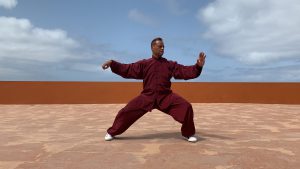From Monday to Thursday you can train for two and a half hours each morning and afternoon. Each day you can work on 2 separate disciplines (one from category A and one from category B) for 2.5 hours each, totalling 5 hours per day. This allows for 10 hours of intensive training in each of your chosen disciplines over 4 days. Please select one from each category.
A1 Subtle Internal Work for Health and Martial Effectiveness – Gianfranco Pace
Accessible to all
Warm-up with the Qi Gong for the tendons.
Working with intention: how to boost it up. A strong intention for a higher energy level.
The movement in the water qi gong and the movement in pushing hands – a comparison.
Conditioning exercises: from Tui Shou to San Shou.
A2 Biospirali – Chiara Vendettuoli
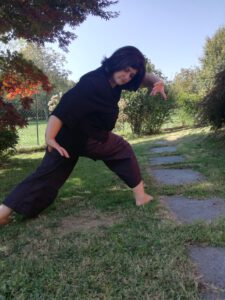
Accessible to all
Biospirali is a Qigong system that is the result of long and in-depth research by Master Franco Mescola.
The method consists of a connected sequence of movements, performed by paying attention to the integration and harmonisation of the systems we are composed of (mind – body – breath) and the structure that supports us.
The spiral is the pattern that forms and informs, it is a shared language, our and Nature’s system of functioning.
Through the practice of Biospirali, benefits can be obtained at the level of bone structure, joints and articulations, at the muscular level, as well as at the energetic level.
Consistency and regularity allow the achievement of a harmonious balance (physical, mental and emotional) between mind and heart.
The exercises we will practise work on relaxing and stretching the fascia system. The fascia is an independently regulating system, capable of influencing the health of the entire body through correct tissue tone and has a strong impact on mental and emotional well-being.
This will include some partner work to make the connection of Biospirale exercises with sensing hands.
A3 Xingyiquan for Taijiquan practitioners – Javier Arnanz
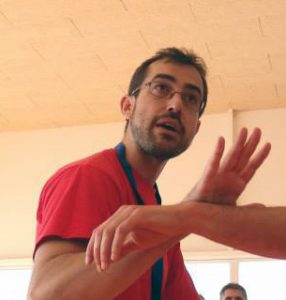
Accessible to all although some previous experience would be beneficial
Xingyiquan, one of the ‘three internal martial arts,’ is thought to contrast with as well as complete its sister art Taijiquan. Known in English as ‘form-and-will fist,’ Xingyiquan provides another look at internal arts principles according to the five-phases (wuxing) concept.
In these sessions, we will practice the Xing Yi individual fists and partner work and discover the similarity and difference in Xing Yi Quan and Tai Chi Quan. For Example, how is Fair Maiden related to one of the fists in Xing Yi, and how we can use the Xing Yi principles and apply to our Tai chi Chuan and creating interesting and effective result.
In the same way an amplifier can create interesting distortions for the guitar, Xingyiquan can be used to create distortions in our Taiji practice.
A4 4 Weapons – 4 Directions – John Bolwell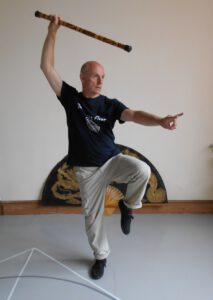
Accessible to all
Broadsword + (Shield)
Staff
Walking Cane
Cloak & Dagger
For each weapon, we will explore its particular characteristics and how the body and weapon may move in a coordinated unity.
To deepen our experience, we will learn 4 short sequences that orientate around the 4 directions.
If you have any appropriate training equipment, please bring it along, otherwise there will be some you can borrow.
For the workshop purposes, a hand towel or a tea towel would be a suitable substitute for a cloak.
B1 Four Hands Sizheng Tuishou & Moving Step Push Hands – Sam Masich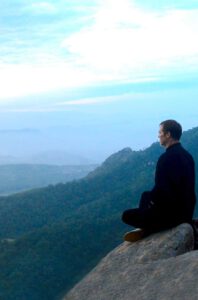
Accessible to all
As we can read in Chen Yanlin’s original introduction: “when practising the gestures of ‘Thirteen Powers Boxing’, the body, mind and qi are all nourished. In order to advance further, one must learn each of the energies: ‘listening’, ‘comprehending’, ‘sticking’ and ‘issuing’. These cannot be achieved without (studying) push-hands.”
Nowadays, (Taijiquan) players begin their push-hands practice with the fixed-stance practice ‘peng, lü, ji, an’ sizheng tuishou but often do not know the best order in which to practice.
This seminar goal is to teach three of the basic exercises that every taiji practitioner should learn or polish on their way to Push hands: On the first exercise we will look at ‘listening’, ‘comprehending’, ‘sticking’ and ‘issuing’.Through partner exercises we will explore the meaning of these 4 energies.
Meanwhile in the second exercise we will learn moving with the feet using following and covering steps. We will learn to move respecting the principles of taichi and through the movement of the feet we will test and improve our ability to ‘listen’, ‘comprehend’, ‘stick’ and ‘issue’.
Finally on the third exercise we will learn 4 hands circling peng, lü, ji, an (sizheng tuishou) while we ‘listen’, ‘comprehend’, ‘stick’ and ‘issue’.
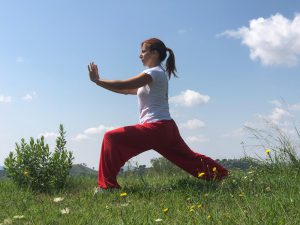 B2 Five Animals Qigong – Margherita Padalino
B2 Five Animals Qigong – Margherita Padalino
Accessible to all
The five animals Qi Gong is a set which stimulates the vitality of the practitioner by means of the idea of being a particular animal, not merely pretending to be it.
Every animal has particular characteristics and behaviours which together will help everybody to have a happier life, to become stronger, to be a ‘dragon’. The movements are ruled, as ever, by the same principles which are practiced in Taijiquan, so the internal work will be studied and practised together with the exercises.
B3 Tai Chi Chuan Martial Principles – Paul Silfverstrale 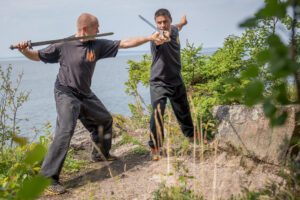
“Old Hand Tai Chi Chuan”
B4 Sensitive Standing and Walking – Helmut Oberlack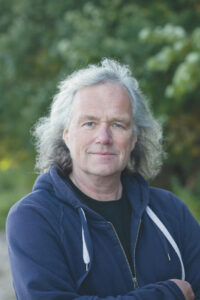
Accessible to all
Copyright 2025 Tai Chi Caledonia | Privacy Policy
